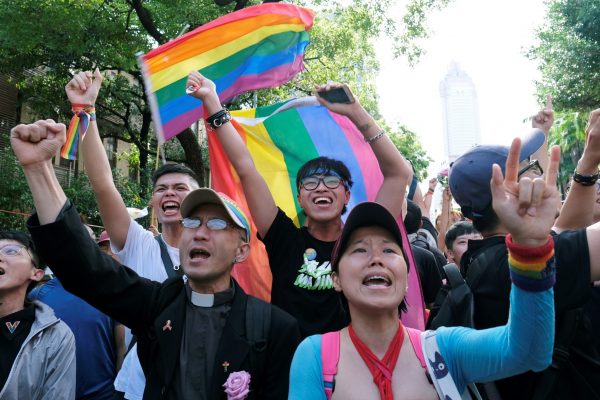This social prejudice remained and homosexuality was pathologised as a form of mental illness throughout the 1970s and 80s when Western medical discourses were introduced to Taiwan. Citizens involved in same-sex intimacy in public risked being arrested by police and reports of such behaviour were couched in terms of deviancy. This was in part a product of the public’s fear of AIDS, presented as a foreign disease associated with sexual promiscuity.
But the tables started to turn from 1987 when Taiwan abandoned martial law. This would lay the groundwork for the growth of open support for marriage equality in the following decades.
The growing democratic atmosphere in the years after 1987 enabled LGBT activists to form their own communities and pursue their own agendas against mainstream heterosexual marriage values. This resulted in the establishment of various gay and lesbian organisations and LGBT activist groups in the 1990s, with the first annual ‘pride’ event held in 2003.
The Taiwanese government led by the Democratic Progress Party (DPP) also implemented a series of measures in the 2010s to de-stigmatise and protect the rights of LGBT communities, introducing LGBT topics to primary school textbooks and establishing anti-discrimination rules based on sexual orientation in public and in the workplace.
Despite opposing voices from other political parties, the Constitutional Court ruled in May 2017 that same-sex couples had legal rights to marry. The Court argued that the existing civil law was unconstitutional because it failed to grant equal rights to same-sex couples.
The legislators were given two years to amend or rewrite the law. Predictably, this announcement generated a public backlash from opponents, leading to a referendum in November 2018. But the results showed that the majority voted for ‘restricting marriage under the Civil Code to one man and woman’ and ‘protecting rights of same-sex couples outside of the Civil Code’.
Yet in the end, the voices of the opposition were not as powerful as those of the supporters and decision-makers. Despite the fact that same-sex couples still do not have the same rights to child adoption and surrogacy as heterosexual couples — and gays and lesbians with certain nationalities are still unable to marry their Taiwanese partners because of marriage restrictions in their home countries — same-sex marriage was legalised in Taiwan on 24 May 2019. Same-sex marriage supporters held celebrations and expressed their gratitude to the DPP and its leaders on social media. Others expressed hope that mainland China and other Asian countries could follow in Taiwan’s footsteps.
Even so, some still hold reservations. Many are concerned that the law may be de-legislated by the conservative party once the government changes, while others have sworn to strike back in 2020 as the legal change did not reflect the results of the referendum.
It seems that the battle is far from over — conservatives will continue to fight for conventional marriages that value, first and foremost, reproduction to carry on the paternal line.
The debate is also underpinned by the ideological clash between pro-Taiwan and pro-mainland communities. The DPP is likely to fight to safeguard its ingrained pro-Taiwan political identity, which aims to build Taiwan’s international image through human rights advocacy as a way of consolidating Taiwan’s independence from mainland China. The adoption of an independent marriage system both alludes to and reinforces the ‘Two China’ conception.
Religion-affiliated parties and religious organisations also create irreconcilable political identities between different parties in Taiwan. Unlike in Japan — an approximation to a secular nation, whose party system is not operated by predetermined values and where the conflict between ideological conservatism and liberalism is less influential in the policy-making process on moral issues like homosexuality — the policy-making process in Taiwan is heavily shaped by the conflict between religious and secular politics. This leads to the formation of competing coalitions around partisanship.
Though the same-sex marriage battle may have ended on paper, the fight will continue. The campaign is not simply a case of split opinions on marriage — it touches on the paradoxes of democracy in Taiwan, including conflicted party identities that intertwine with religion and the clash of opposing political ideologies.
Dr Pan Wang is a Senior Lecturer in Chinese and Asian Studies at the University of New South Wales, Sydney.

